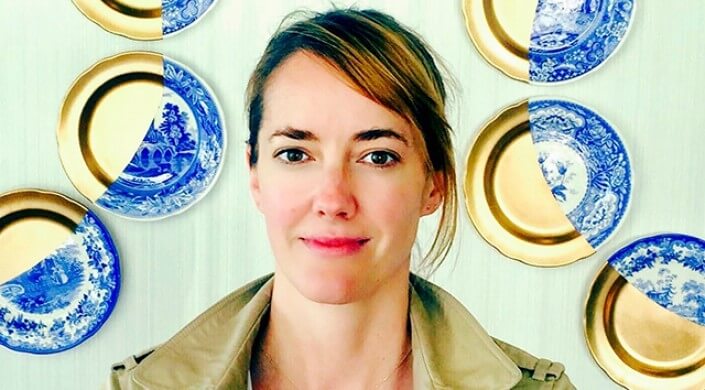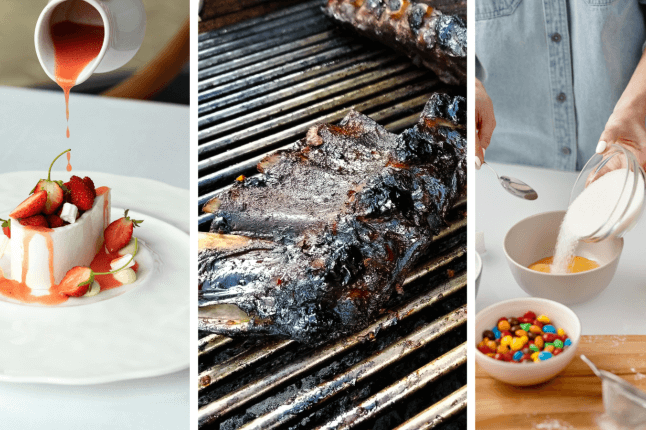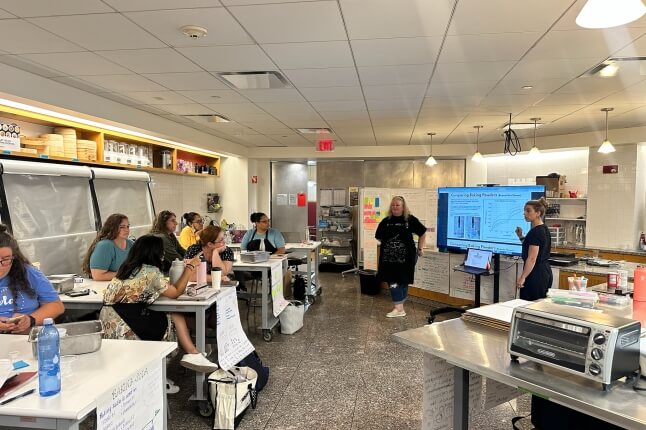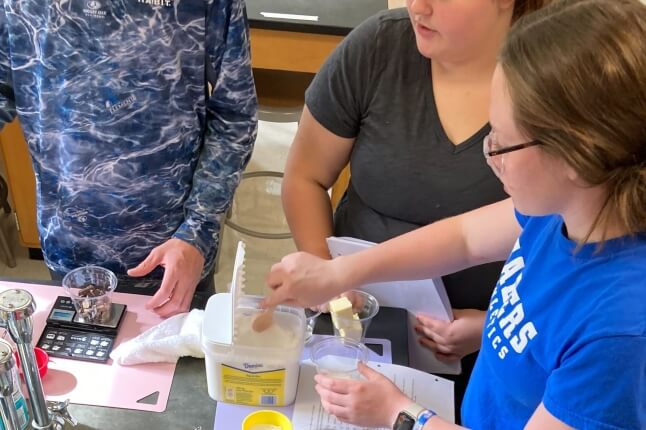News
Beth Altringer developed Chef League, a mobile game that pits users against other humans and digital chefs in heated competitions to fix bad recipes. (Photo by Yarrow Kraner)
Standing over a steaming pot that holds the evening’s dinner, you scoop out a spoonful to taste the delicious fruits of your labor and find the dish to be completely blasé, as if it is missing some key ingredient. With a pantry teeming with different spices and a fully stocked fridge, what ingredient do you reach for that could rescue this dish from mediocrity?
It’s a common conundrum faced by home cooks and seasoned chefs alike, and one that Harvard John A. Paulson School of Engineering and Applied Sciences faculty member Beth Altringer has made the focus of a mobile game she developed, Chef League.
The game pits users against other humans and digital chefs in heated competitions to fix bad recipes.
“I admire people who, faced with a kitchen of empty cabinets, can whip up a masterpiece - like Samin Nosrat describes so well in ‘Salt, Fat, Acid, Heat.’ I built this game to teach myself how chefs improvise and fix recipe problems intuitively,” said Altringer, Director of the Desirability Lab and Senior Preceptor in Innovation and Design. “The goal is to provide a platform for all of us to learn by gaming.”
The game includes several types of challenges. In a recipe challenge, the player is presented with a bad recipe—a ‘one-star’ recipe scraped from cooking websites—and goes up against two chefs in a competition to make the biggest improvement to the dish.
For instance, one challenge serves up a dull margherita pizza that needs to taste fresher or spicier. A player searches through a database of ingredients, which provides information about the flavors of each, and chooses one item to add. The winner selects the ingredient that most improves the taste of the dish, based on ratings from culinary experts.
The game includes several digital competitors—artificial intelligence chefs that were built by conducting natural language processing on the text of millions of online recipe reviews. Altringer utilized sentiment scores and topic modeling to create eight data-driven chef personas. While flavor is subjective, the AI chefs are designed to represent the most common palates.
In addition to repairing recipes, Chef League helps human players improve their palates. Users are asked to rate the sweetness, sourness, richness, spiciness, crunchiness, and savoriness of different ingredients on a sliding scale, and then compare their answers to those of culinary experts.
“A lot of people have never actually stopped and thought about how these different ingredients actually taste,” Altringer said. “This could open up someone’s eyes to new flavors. Blueberries, for example, are not only sweet; they are also more acidic than tomatoes. If you learn this, you might try blueberries the next time you need to brighten up flavors with acidity.”
Altringer’s interest in food and flavor began during her days as a graduate student at the University of Cambridge, where she participated in international blind wine tasting competitions. She was fascinated by the ability to tell the story of how a wine is made by tasting it, zeroing in on everything from the drink’s chemical properties to the type of soil where the grapes were grown.
At Harvard, Altringer leveraged that interest into the Flavor Genome Project, an online database that enables users to look up any ingredient and see its flavor attributes. In addition to listing details like acidity level, the database also describes foods it pairs well with and commonly confused ingredients.
When the database proved to be too complex for a casual cook, Altringer used it to build a mobile game to teach amateurs.
“The casual, mobile game space is clearly very engaging, but there is room for fun-first games that are also teaching you something for your offline life,” she said. “I would love for this to eventually become a platform for interactive understanding about food and flavor.”
She hopes to continue adding new elements to Chef League. Altringer would like to incorporate sponsored ingredients, perhaps in partnership with the U.N. World Food Program’s food waste initiative, for instance, where a user could earn extra points for using an ‘ugly’ carrot that might typically be discarded.
Altringer would also like to get chefs in the game. Chef League currently incorporates data from chefs, but she hopes to have human chefs compete, providing inspiration and advice to users. Future versions may also include the latest science about flavor compounds and the genetics of a person’s taste preferences to give casual users access to state-of-the-art knowledge.
“You can read a chef’s memoir or a cookbook, make every recipe from a culinary website, but you still haven’t learned to be creative in your own way,” she said. “You haven’t developed your own chef intuition in a way that capacitates you to do more. Why can’t these different touch points build on each other to teach how flavors work?”
Topics: Cooking
Cutting-edge science delivered direct to your inbox.
Join the Harvard SEAS mailing list.
Press Contact
Adam Zewe | 617-496-5878 | azewe@seas.harvard.edu



